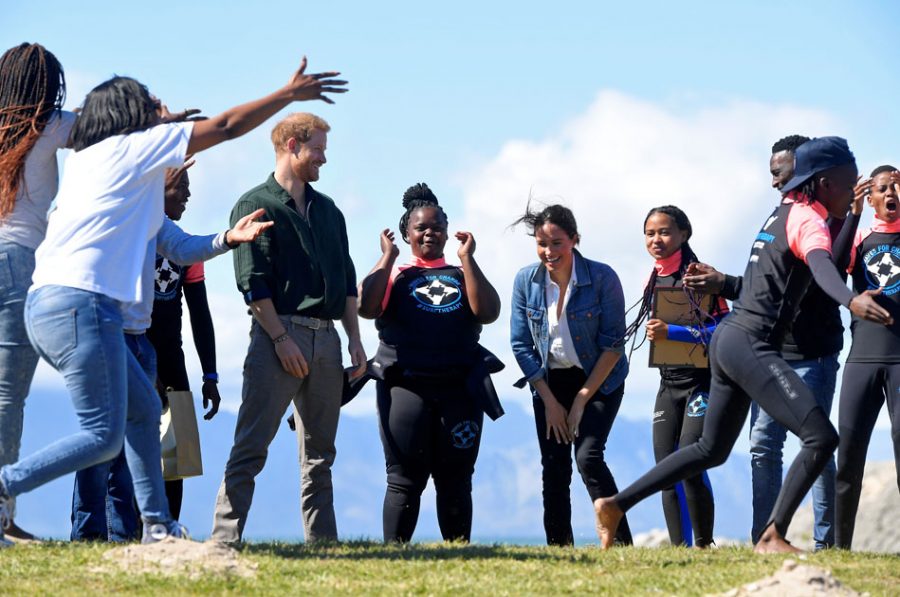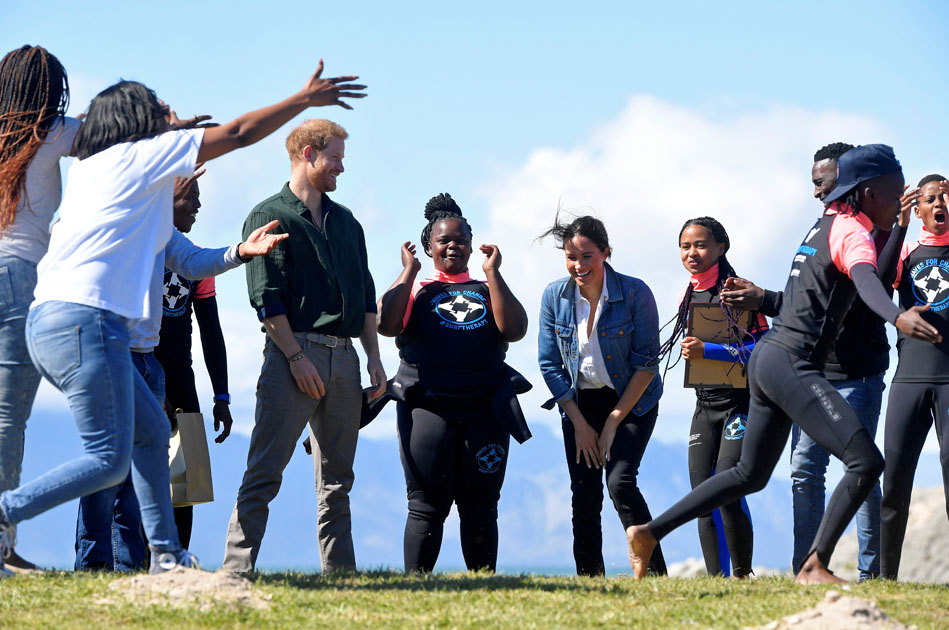
Prince Harry and Meghan Dance with Mental Health Mentors on Cape Town Beach
CAPE TOWN – Britain’s Prince Harry and his wife Meghan danced and chanted with a group of mental health mentors at Cape Town’s Monwabisi beach on Tuesday, on the second day of their ten-day Africa tour. The royal couple visited the Waves for Change project, which grew from a small surfing club started in Masiphumelele […]

CAPE TOWN – Britain’s Prince Harry and his wife Meghan danced and chanted with a group of mental health mentors at Cape Town’s Monwabisi beach on Tuesday, on the second day of their ten-day Africa tour.

The royal couple visited the Waves for Change project, which grew from a small surfing club started in Masiphumelele township in 2009, and which helps young people from poor and violent communities develop trust and confidence through surfing.
The couple met founder Tim Conibear and 25 surf mentors, wearing black and pink wetsuits, who demonstrated the group activities they use to support the mental health of young people who had survived traumatising experiences.

“So many of these communities have been through a very similar traumatic experience, they’ve now come into a place like this, into this charity, to be able not only share their experience but to help the younger generations,” Harry said.
“This is actually what’s making a difference and what matters,” Meghan said.
The Duke and Duchess of Sussex are on their first overseas tour since the birth of their first child Archie, who has accompanied them on their visit.

The Monwabisi compound also houses the Lunchbox Fund charity, which benefited from public donations made to celebrate the birth of baby Archie Mountbatten Windsor.
Harry praised the work of the fund, which provides 27,000 hot, nutritious meals each day to vulnerable children at the surf project and in schools in the townships.
“It’s amazing to think that just on the other side of here you’ve got tin huts with all of these kids with nothing. And they’re bringing them together. Nice hot meal provided by Lunchbox Fund,” said Harry.
Many of the young people had been terrified of the sea before they joined the youth group, he said.
“Now they can swim, they can surf… it’s incredible,” he said.
ABALONE POACHING
The 35-year-old prince then heard from Cape Town city officials about the challenges facing South Africa as it battles drug-smuggling and poaching criminal syndicates that are driving the endangered gourmet mollusc abalone to extinction.
“Poaching is a huge problem and the over-exploitation of the species is at the point where it is almost extinct,” Wayne Dyason, Cape Town marine police unit’s principal inspector, told Reuters. Abalone, known locally as “perlemoen”, is prized in Asia. Poachers often trade it for drugs, Dyason said.
Every year, poachers steal about 2,000 tonnes of abalone from South Africa, worth around $60 million, said Traffic, an organisation monitoring global trade in animals and plants.
Prince Harry, joined by two Royal Marines helping to train the unit, briefly went out on an inflatable dinghy but high winds prevented him from visiting Seal Island, an abalone poaching hotspot in False Bay.
In 1795, the British defeated the Dutch in a sea skirmish in False Bay known as the “Battle of Muizenberg,” allowing Britain to take over Cape Town, an important sea trading port.
Later in the day, the Duke and Duchess will visit South Africa’s oldest mosque, Auwul Mosque, in the former slave enclave of Bo-Kaap in Cape Town’s city centre.

Harry, Queen Elizabeth’s grandson and sixth in line to the throne, has been visiting southern Africa for two decades for holidays and conservation work.
He will travel alone on Thursday to Botswana, where he and Meghan holidayed shortly after they began dating in July 2016 and returned to in 2017 for a romantic getaway.
Harry then heads to Angola, visiting the landmine clearance project that featured in iconic photographs of his late mother, Princess Diana, during her campaign to ban landmines.
He ends the solo section of his tour in Malawi, where he will meet President Peter Mutharika.
(editing by Katharine Houreld and Alexandra Hudson)
